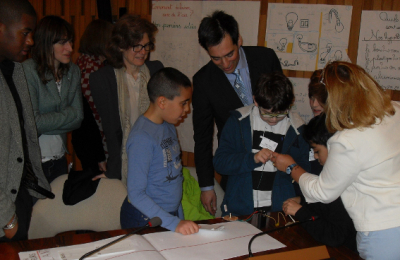


On 5 April 2016, the International Science, Technology and Innovation Centre for South-South Cooperation (ISTIC) hosted a forum at UNESCO headquarters in Paris on ‘Embracing the Future: Improving the quality of science instruction in schools’.
ISTIC is chaired by Dato Lee Yee Cheong of the Academy of Sciences Malaysia, who also chairs the IAP Science Education Programme (IAP SEP).
In his welcome address, Cheong introduced the concept of Inquiry-based Science Education (IBSE), saying that it was a misconception that IBSE had a total focus on science. Instead, he said, it is focused on ‘inquiry’ – stimulating young minds to question what they know and to innovate. “Through IBSE, we can show schoolchildren that they should question any beliefs they have in ‘prophets’ such as religious extremism, excessive greed or unsustainable consumption,” he said.
Cheong also introduced the La Main à la Pâte Foundation (LAMAP]), represented by its president, Daniel Rouan, and director, David Jasmin. LAMAP is a spin-off from the Academie des Sciences, France, that now has 20 years of experience in promoting IBSE in more than 50 countries. “Although LAMAP and UNESCO are both based in Paris,” he added, “this is the first time they are coming together.”
In her address, Irina Bokova, Secretary General of UNESCO, noted that, in order to achieve the Sustainable Development Goals (SDGs): “We need more science, better science, and inclusive science, and we need governments to listen to science.
“And science has a need for young talent,” she continued, complimenting the initiative of the Government of Malaysia that is rolling out a science education programme for Least Developed Countries (LDCs) and Small Island Developing States (SIDS). “We must put science at the heart of the school curriculum.”
For its part, the Government of Malaysia was represented at the Forum by the Hon Dato Seri Mahdzir Khalid, Minister of Education of Malaysia, who noted that pilot trials in Malaysia had shown IBSE to be effective, so now the Malaysian government was rolling out a three-year project with LAMAP and the Malaysian Institute of Teacher Education.
Among the other speakers at the Forum was Suad Abdel Raziq, Federal Minister of Education for Sudan, who noted that the provision of micro-science kits to primary schools in Sudan had helped increase the number of pupils in secondary schools following science courses from 28% in 2012 to 35.5% in 2016.
“By expanding this project across the country,” added Raziq, “we are hoping to reach 45% by 2020.”
For many, the highlight of the Forum was the demonstration of IBSE by a group of Parisian schoolchildren and their teachers. As former IAP co-chair, Yves Quèrè, discovered when asking about a windmill experiment, it was clear that it was the children who were explaining the science and the teachers who remained in the background – proof, if any were needed, of the benefits of IBSE.
Among the recommendations to emerge from the meeting were:
Around 100 delegates, including representatives of the Permanent Delegations to UNESCO as well as UNESCO staff attended the Forum.
IAP was represented by its Coordinator, Peter McGrath, who, in the discussion session, argued that although great successes had been achieved by the IAP SEP and LAMAP in promoting IBSE through their bottom-up approaches, the time has come to push for a top-down approach – perhaps with the endorsement of UNESCO – whereby governments are requiring the IBSE approach in their national science curricula, and that teacher-training colleges are on board to train a new generation of IBSE-informed teachers.